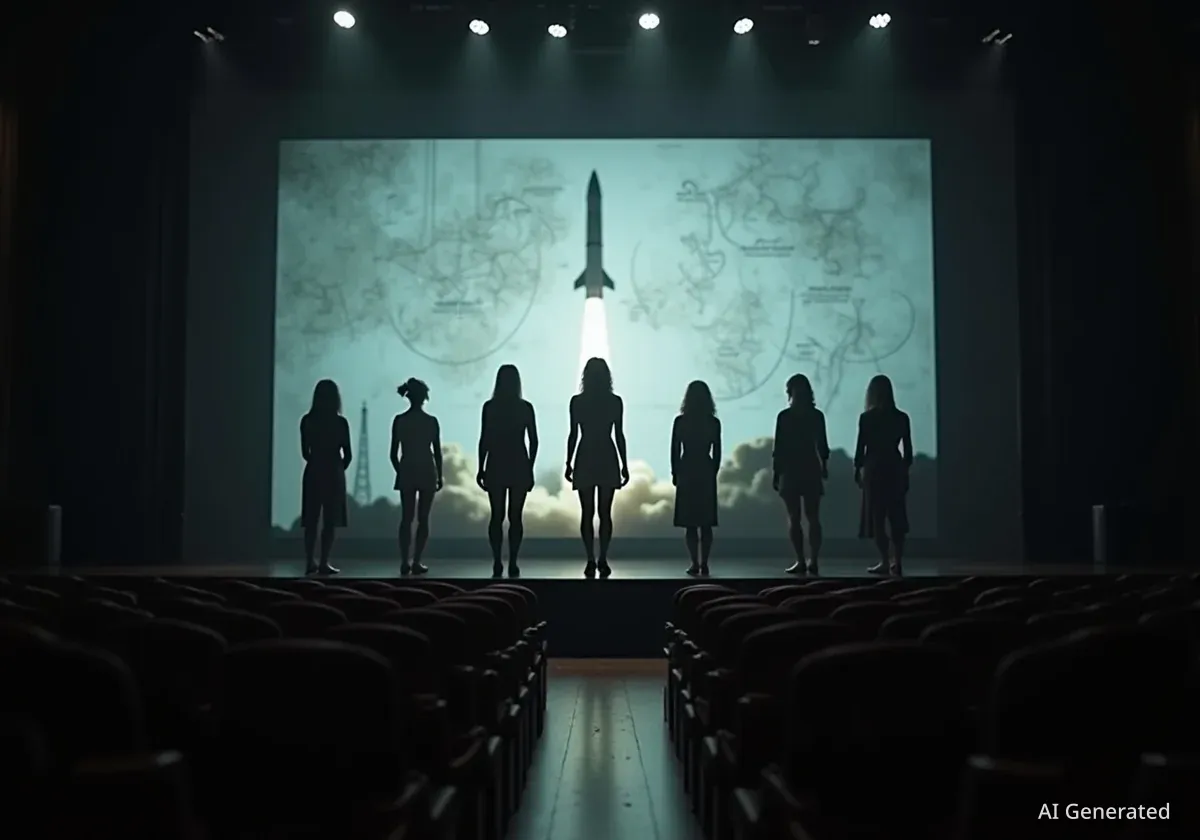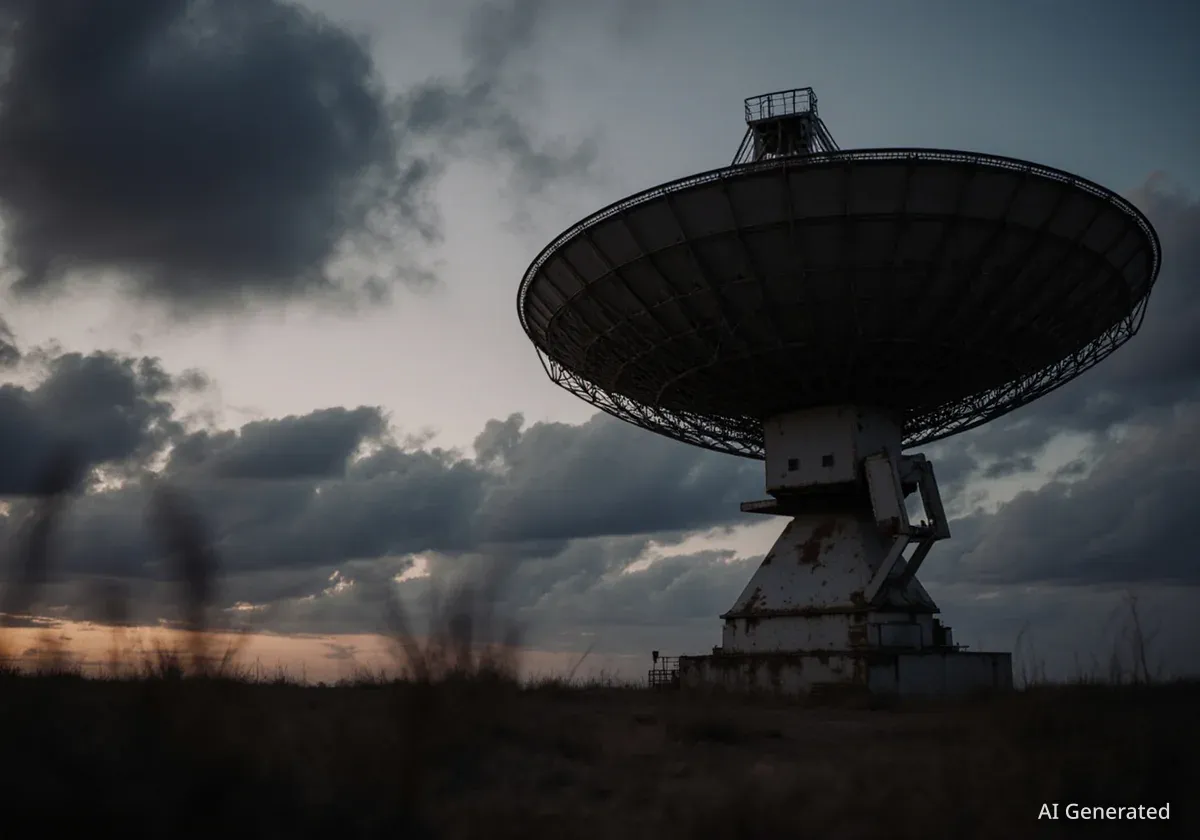Synchronicity Theatre in Atlanta is staging "The Rocket Men," a new play that examines the complex history of the U.S. space program. The production, which runs from October 10 to November 2, 2025, uses an all-female cast to tell the story of former Nazi scientists who were instrumental in America's journey to the Moon.
Written by Crystal Skillman and directed by Rachel May, the play delves into Operation Paperclip, a secret post-World War II program that brought German rocket scientists to the United States. It raises critical questions about historical memory, national ambition, and the moral compromises made in the pursuit of technological superiority.
Key Takeaways
- Synchronicity Theatre in Atlanta is presenting "The Rocket Men" from October 10 to November 2, 2025.
- The play focuses on the true story of German scientists from the Nazi regime who helped build NASA's space program through Operation Paperclip.
- In a deliberate artistic choice, the production features an all-female cast of six portraying the male historical figures.
- The narrative also highlights the forgotten history of female concentration camp prisoners forced to build V-2 rockets.
New Play Confronts a Complex Chapter of US History
"The Rocket Men" is making its debut as a National New Play Network Rolling World Premiere at Atlanta's Synchronicity Theatre. The production offers a contemporary look at the events following World War II, when the U.S. government recruited German scientists to gain an edge in the Cold War.
The play's narrative moves between the past and present, exploring the lives these men built in North Alabama while contributing to the creation of NASA. According to the creators, it poses a central question: who does history choose to remember, and what is the human cost of those choices?
Performance Details and Creative Team
The show is scheduled for a limited run, with performances held from Wednesday to Saturday at 8 p.m. and on Sundays at 5 p.m. The cast includes Atlanta-based artists Laura Boston Edwards, Amelia Fischer, Imani Joseph, Gillian Rabin, Suzanne Roush, and Vallea E. Woodbury.
The production is led by director Rachel May, who brings a personal connection to the material. Playwright Crystal Skillman is known for works that engage with pressing social and historical issues through innovative theatrical forms.
What Was Operation Paperclip?
Operation Paperclip was a secret U.S. intelligence program in which more than 1,600 German scientists, engineers, and technicians were taken from former Nazi Germany to the U.S. for government employment after the end of World War II. The primary purpose was to leverage German intellectual resources to help the U.S. in the Cold War against the Soviet Union and to ensure such expertise did not fall into Soviet hands.
The Artistic Choice of an All-Female Cast
A defining feature of "The Rocket Men" is its casting. Six women take the stage to portray the male-dominated world of rocket science and military power. This decision was a foundational element of the play's concept from its inception.
Playwright Crystal Skillman explained the reasoning behind this choice. "From the start, I wanted audiences to be confronted with the fact that those actors don’t look anything like these figures in history," she stated. The intention is to immediately signal that the play is examining this history from a different and critical perspective.
"This is a surreal time in America. The play lives in these complications. Theatre is a forum of truth. The play is about what it means to be an American then and now."
<
This casting also serves to highlight a buried aspect of the story. Skillman points to the historical fact that female prisoners from the Mittelbau-Dora concentration camp were used as forced labor to construct the V-2 rockets developed by these same scientists in Germany. "This is why they tell the story," Skillman added, connecting the performers to the silenced women of the past.
Themes of Accountability and Patriotism
"The Rocket Men" navigates the difficult territory between national triumph and moral accountability. It examines the legacy of the Apollo program while refusing to ignore the dark origins of its foundational technology and the backgrounds of the men who created it.
Director Rachel May shared how the script resonated with her personally. "As a granddaughter of a Holocaust survivor, this story shook something loose in me," May said. She described the play as a powerful tool for re-examining accepted historical narratives.
Rachel May praised the script as "sharp, surprising, and full of theatrical invention." She emphasized that the play "reclaims the lost voices of women erased by war and science alike, and asks us to reimagine what patriotism really looks like."
The production aims to create a dialogue about the nature of American identity and the complexities of patriotism. By presenting this story in a contemporary theatrical framework, it encourages audiences to reflect on how past events continue to shape the present.
A Timely Exploration of Historical Memory
While the play is set against the backdrop of the 1940s and the Space Race, its themes are presented with a sense of modern urgency. The creative team believes that examining how history is told—and what is omitted—is more relevant than ever.
The story of Wernher von Braun and his team is often celebrated as a key part of America's victory in the race to the Moon. "The Rocket Men" seeks to complicate that narrative by reintroducing the inconvenient truths that were set aside in the name of progress.
By placing women at the center of the storytelling, the play not only challenges the historical record but also the conventions of theatrical representation. It serves as a reminder that the act of remembering is an active choice, one that can either reinforce old power structures or create space for new understanding.





